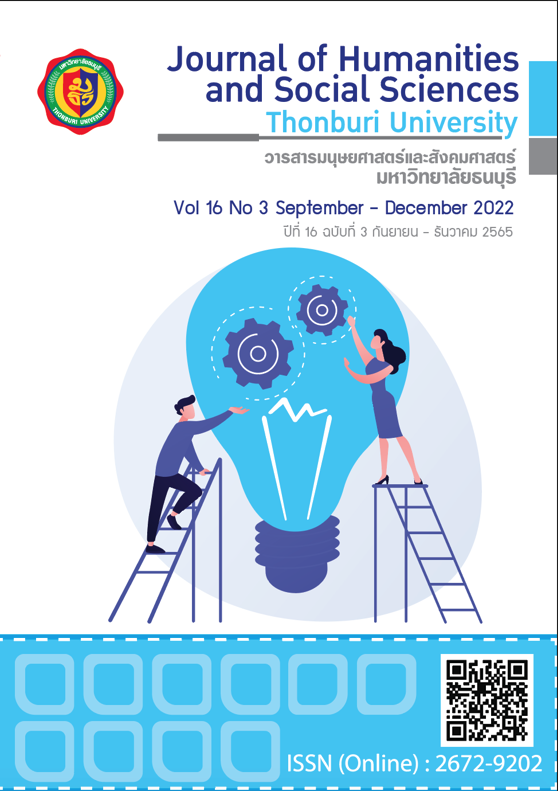Social Studies Learning Innovation According to Appreciative Inquiry Approach for Develop Creative Thinking Competencies in the Existence of Local Cultural Values of Secondary School Students
Keywords:
Social Studies Learning Innovation, Appreciative Inquiry Approach, Creative Thinking Competencies, The Existence of Local Cultural Values, Secondary School StudentsAbstract
The purposes of this article are to create a Social Studies Learning Innovation and to evaluate the learning units based on Appreciative Inquiry Approach to develop creative thinking competencies in terms of the existence of local cultural values for secondary school students. A research method aims to create a instructional model based by reviewing the paper and related research. It is then created into a conceptual framework and reviewed by five experts to evaluate the suitability of the design's components and content. The finding of the research revealed that consists of two components: 1) concepts, meanings, conceptual learning, and application are all principles to consider when creating an instructional model based on Appreciative Inquiry Approach and 2) learning to develop creative thinking competencies in terms of the existence of local cultural values includes Appreciative Inquiry Approach Learning Units. It can be concluded that the creation of an instructional model can be used as a concrete innovation in learning through educational institutions.
References
ชรินทร์ มั่งคั่ง. (2560). อุดมคติวิทยา: หลักสูตรสังคมศึกษาเพื่อปวงชน. กรุงเทพฯ: สำนักพิมพ์แห่งจุฬาลงกรณ์มหาวิทยาลัย.
ทัศนีย์ ทองไชย. (2556). การพัฒนารูปแบบการเรียนการสอนตามแนวคิดการจัดการความรู้ภูมิปัญญาท้องถิ่นสำหรับนักเรียนชั้นมัธยมศึกษา. วิทยานิพนธ์ปรัชญาดุษฎีบัณฑิต สาขาวิชาหลักสูตรและการสอน มหาวิทยาลัยศิลปากร.
ปฐม หงษ์สุวรรณ; และ ศิราพร ณ ถลาง. (2562). ประเพณีสร้างสรรค์ในสังคมไทยร่วมสมัย. กรุงเทพฯ: ศูนย์มานุษยวิทยา สิรินธร.
ปรมินท์ จารุวร. (2562). คติชนสร้างสรรค์: บทวิเคราะห์และทฤษฎี. กรุงเทพฯ: ศูนย์มานุษยวิทยาสิรินธร.
ปวีณา ผาแสง; และ ขนิษฐา นครประสาท. (2558). กระบวนการเรียนรู้และการมีส่วนร่วมของชุมชนเพื่อการอนุรักษ์ สืบสานศิลปวัฒนธรรมพื้นถิ่นน่าน: กรณีศึกษาตำบลดู่ใต้ อำเภอเมือง จังหวัดน่าน. น่าน: วิทยาลัยชุมชนน่าน.
ราชกิจจานุเบกษา. (2561). ยุทธศาสตร์ชาติ พ.ศ. 2561- 2580. สืบค้นเมื่อ 27 มกราคม 2565, จาก http://www.plan.bru.ac.th
วริศรา อนันตโท. (2559). จามเทวีบูชา: การผลิตซ้ำตำนานและการสร้างพิธีบวงสรวงในสังคมไทยร่วมสมัย. วิทยานิพนธ์อักษรศาสตรดุษฎีบัณฑิต สาขาวิชาภาษาไทย, จุฬาลงกรณ์มหาวิทยาลัย.
วัชราภรณ์ ดิษฐป้าน. (2557). พระอุปคุต: การสืบทอดและการผลิตซ้ำความเชื่อ ตำนานและพิธีกรรมในสังคมไทยปัจจุบัน. วิทยานิพนธ์อักษรศาสตรดุษฎีบัณฑิต สาขาวิชาภาษาไทย จุฬาลงกรณ์มหาวิทยาลัย.
สิระ สมนาม. (2560). การพัฒนารูปแบบการเรียนรู้โดยใช้แนวคิดเชาวน์ปัญญาเชิงปฏิบัติร่วมกับกระบวนการสุนทรียสาธก เพื่อส่งเสริมความสามารถในการวิเคราะห์วรรณคดี สำหรับนักศึกษาระดับปริญญาบัณฑิต. บัณฑิตวิทยาลัย มหาวิทยาลัย ศิลปากร.
อภิลักษณ์ เกษมผลกูล. (2556). เรื่องเล่าพื้นบ้านกับการสร้างมูลค่าเพิ่มแก่ผลิตภัณฑ์ และการท่องเที่ยวท้องถิ่นในภาคกลาง: มิติความสัมพันธ์ระหว่างปรากฏการณ์โหยหาอดีตกับเศรษฐกิจสร้างสรรค์. วารสารอักษรศาสตร์. 42(2): 103-132.
Cooperrider, Barret, Srivastva. (1995). Social Construction and Appreciative Inquiry: A Journey in Organizational Theory. In the book Management and Organization: Relational Alternatives to Individualism. Ashgate Publisher.
Cooperrider, D. L., Whitney, D., & Stavros, J. M. (2008). Appreciative inquiry handbook: For leaders of change. 2nded. Brunswick, Ohio: Crown Custom publishing, Inc.
Mohr, B. J. and Watkins, J. M. (2002). The essentials of appreciative inquiry: A roadmap for creating positive futures. Pegasus Communications, Incorporated.
Watkins, Mohr and Kelly. (2011). Appreciative inquiry: change at the speed of imagination. San Francisco, CA: Pfeiffer.
Whitney, D., &Trosten-Bloom, A. (2003). The power of appreciative inquiry: A practical guide to positive change. San Francisco, California: Berrett-Koehler Publishers, Inc.
Translated Thai References
Anantato, W. (2016). Camadevi Worship: Legend Reproduction and Ritual Construction in Contemporary Thai Society. (Dissertation in Ph.D. Program in Thai, Chulalongkorn University). (in Thai)
Distapan, W. (2014). The Belief in Phra Upakhut’s Defeat of Mara: Transmission and Reproduction in Contemporary Thai Society. (Dissertation in Ph.D. Program in Thai, Chulalongkorn University). (in Thai)
Hongsuwan, P.;& Nathalang, S. (2019). Creative Traditions in Contemporary Thai Society. Bangkok: The Princess Maha Chakri Sirindhorn Anthropology Centre. (in Thai)
Jaruworn, P. (2019). Creative Folklore: Analysis and Theory. Bangkok: The Princess Maha Chakri Sirindhorn Anthropology Centre. (in Thai)
Kasempholkoon, A. (2013). Local Narratives and the Making of the Value Additions for Local Products: Relationship between Nostalgic Phenomena and Creative Economy. Journal of Letters. 42(2): 103-132. (in Thai)
Mangkhang, C. (2017). Ideology : Social Studies Curriculum for all. Bangkok: Chulalongkorn University Press. (in Thai)
Phasaeng, P.;& Nakhonprasart, K. (2015). Knowledge Process and Community Participation for Cultural Reserved and Inheritance in Nan : Tumbol South Doo, Aumpher Muang, Nan Province Case Study. Nan: Community College Institute. (in Thai)
Somnam, S. (2017). The Development of Instructional Model Using Practical Intelligence and Appreciative Inquiry to Enhance Analyzing Literature Ability of Undergraduate Students. Graduate School, Silpakorn University. (in Thai)
Thai Government Gazette. (2018). National Strategy 2018- 2037. Retrieved January 27, 2022, from http://www.plan.bru.ac.th (in Thai).
Thongchai, T. (2013). The Development of the Instructional Model according to the Principle of the Knowledge Management, on Local Wisdom for Secondary School Students. (Dissertation in Ph.D. Department of Curriculum and Instruction, Silpakorn University). (in Thai)
Downloads
Published
How to Cite
Issue
Section
License
Copyright (c) 2022 Patcharapa Kunmanee, ชรินทร์ มั่งคั่ง

This work is licensed under a Creative Commons Attribution-NonCommercial-NoDerivatives 4.0 International License.
ผลงานที่ปรากฎในวารสารฉบับนี้เป็นลิขสิทธิ์เฉพาะส่วนบุคคลของผู้เขียนซึ่งต้องรับผิดชอบต่อผลทาง กฎหมายที่อาจเกิดขึ้นได้และไม่มีผลต่อกองบรรณาธิการ






